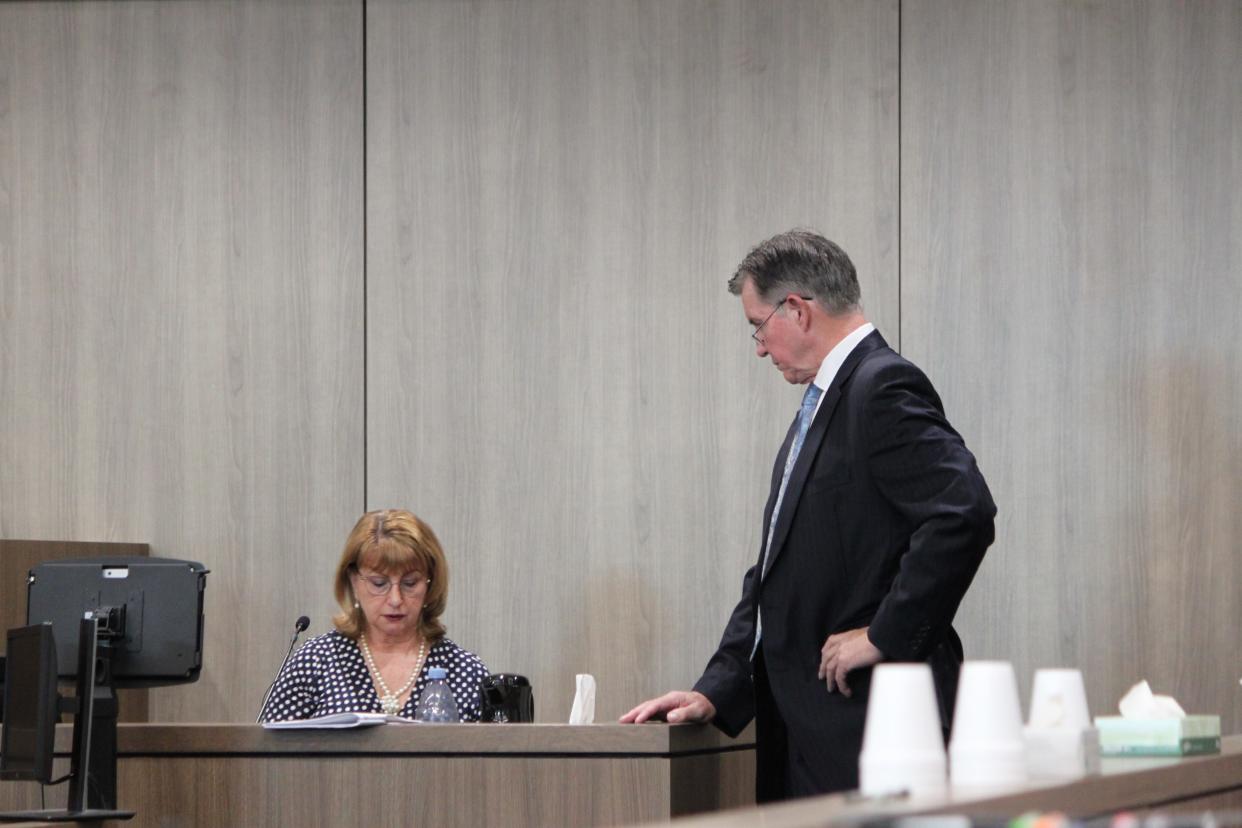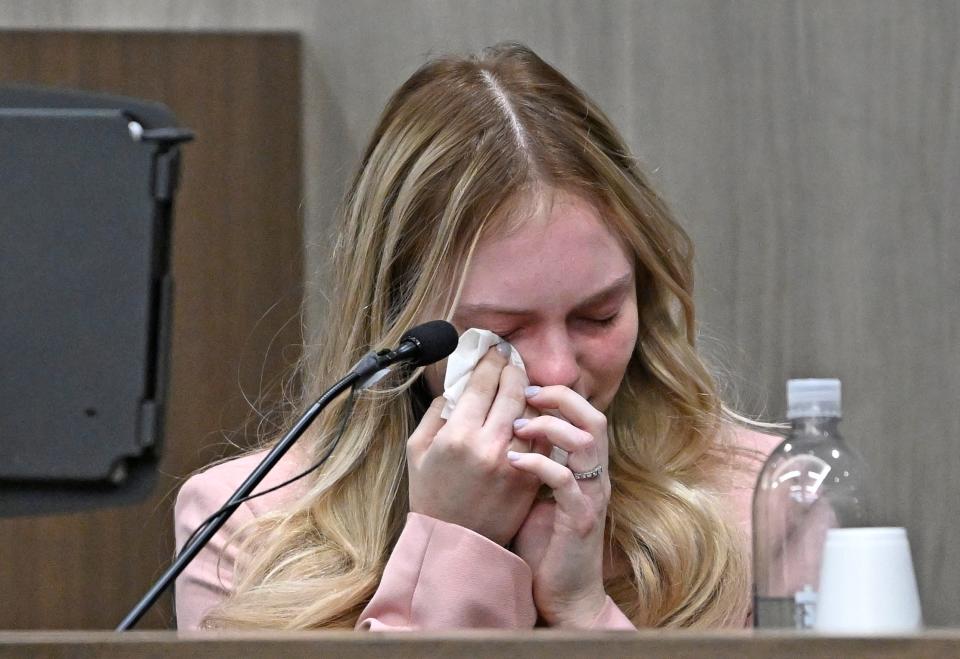'Take Care of Maya' trial: Former hospital social worker denies claims made against her

- Oops!Something went wrong.Please try again later.
A former social worker from Johns Hopkins All Children’s Hospital denied most, if not all, of the allegations against her in court Monday in the civil trial of a Venice family suing the St. Petersburg hospital.
After more than five weeks of testimonies and evidence, the jury heard from one final key witness: former social worker Catherine Bedy, whose name has been referenced throughout the trial.
Bedy worked for the hospital for 12 years before retiring in 2020, according to her testimony Monday. She was initially named as a separate party in the lawsuit brought by the family in 2018 for $220 million, however, during the third day of the jury selection process, the family dropped Bedy from the lawsuit.
Key witness testimony: Maya Kowalski testifies about hospital experience
Keep reading: Kowalskis testify about personal, economic impact for damages
At the time, the family’s attorney, Greg Anderson, said it was a strategic move in order to pursue the charges against the hospital and to not further drag out the trial.
Bedy became involved in the case a few days after Maya was admitted in October 2016 due to complaints of severe stomachache which the family believed to be a relapse of her Complex Regional Pain Syndrome, a disorder that impairs the central nervous system and heightens pain sensations.
Hospital staff became concerned about inconsistencies in Maya's behavior and condition, calling the abuse hotline with suspicions of child abuse against Maya's mother, Beata Kowalski. A court order placed Maya under shelter orders and in the custody of the Florida Department of Children and Families for more than three months.
Bedy was assigned to be Maya Kowalski's social worker while she was in the pediatric intensive care unit, adding she was later assigned by her supervisor to continue to follow Maya when she was moved to the seventh floor of the hospital. Typically, there is a social worker assigned to each unit or floor, however, Bedy said because of her previous experience working with DCF cases and the court system, her supervisor asked her to stay on Maya's case.
For over three hours, attorneys from the hospital and the family questioned Bedy who said the opposite of what others, including Maya Kowalski, had testified to previously.
Bedy denied a plethora of claims including telling Maya she wanted to be her mother, telling Jack to divorce Beata, standing outside Maya's room and eavesdropping while she spoke with her attorney, being alone with Maya in the hospital's chapel, keeping Christmas dresses from the 11-year-old, and she denied that she told Maya that Beata was in a mental institute, and she wouldn't be going home. Bedy also denied saying she'd bake Maya a chocolate cake if she did well in her physical therapy.

Bedy also appeared to look very different than how she had looked in a January 2019 deposition played before the jury, with her hair dyed a lighter color than the dark brown seen on video.
One situation Bedy didn't deny was placing Maya on her lap to comfort her after delivering the news that the 11-year-old couldn't go home for Christmas, testifying that it had been Maya who had asked Bedy to be placed on her lap.
Anderson during his cross pressed Bedy about whether she had at any point received permission from Maya's parents to touch Maya or put the 11-year-old on her lap. Bedy said she hadn't, that she did it to comfort the child and hadn't had time to step out to make any calls.
This echoed testimony from Jack Kowalski who said he at no point gave Bedy permission to touch, hug, kiss, place on her lap, or photograph his daughter.
Anderson also pressed Bedy about the photographs she took of Maya on Jan. 6, 2017, the day Maya left the hospital to attend a court dependency hearing and to see Dr. Ashraf Hanna.
Bedy during direct questioning had told the jury she and the bedside nurse both entered the room to tell Maya they needed to take photos of her before she left based on a request by an attending doctor. Maya had been unhappy, Bedy recalled, but she cooperated with Bedy and the nurse, whose name Bedy couldn't recall, despite being able to recall details of which training bra and shorts Maya wore before and after her visit in court.
When asked if Bedy had reached out to Jack or Beata Kowalski to receive permission to take the photos, Bedy said she hadn't, but she'd received verbal permission from LaPorte. Yet, when further pressed on the fact that it wasn't noted in her daily report that she'd received permission, Bedy was at a loss.
Kowalski family attorney: Trial is about parents' rights to child's medical treatment
Defense argues their case: Dr. Sally Smith testifies, as hospital cites 'chilling effect'
"I did this because it was asked by Dr. Danielson and they had a good reason for it. If it was not a good reason, I certainly would have been discussing it with the medical team," Bedy said, adding that she got authorization from LaPorte.
"So, if (LaPorte) testified in this courtroom that you did not, would she be incorrect?" Anderson questioned.
"I don't know. I was talking to her that day and they were doing their own pictures in Sarasota and so, I explained that we were doing photos here at the hospital," Bedy said.
Anderson also introduced to the jury a hospital policy form that contained information regarding parents' consent for medical treatment when a child is under DCF-sheltered custody. The form states that medical records should reflect attempts to contact the child's parents, legal guardian, or other authorized person to consent to treatment, and if they were unavailable, that should also be documented as well as any other attempts.
Despite Bedy saying that Maya didn't scream or need to be held down during the second set of photos, a hospital report by Bedy indicated Maya had been moaning and crying when Bedy left the room.
Bedy also confirmed in her own testimony that the voice heard on the Nov. 15, 2016, phone call redirecting the conversation between Beata and Maya Kowalski was not her own, but that of DCF case worker Charlotte LaPorte.
The identity of the voice played an integral part in the evidence presented in the case and became a point of contention after LaPorte testified it was her voice despite both Maya and her guardian ad litem, who was appointed by the court and supervised several calls, telling the jury it had been Bedy. Maya also added that Bedy would sit on the edge of her bed during the supervised calls and make faces or roll her eyes, "acting like a child."
In case you missed it: Case worker contests identity of voice in audio clips in 'Take Care of Maya' trial
More: Defense witnesses continue to question Maya's CRPS diagnosis
Medicine specialist called to discuss addiction
The defense called Sharon Levy, an addiction medicine specialist and a pediatrician who practices at Boston Children's Hospital, was called to explain addiction to the jury.
In young, maturing brains, the pre-frontal cortex doesn't have as many protections, making them more susceptible to developing an addiction, Levy said. Short-term effects of using ketamine include psychotic symptoms like hallucinations and delusions, it can include memory impairment, and increase heart rate and lower respiration, Levy said.
I think in some circumstances, ketamine can help certain patients, especially in adults, Levy said.
The ketamine given to Maya was much, much higher than anesthesia doses, Levy said, making it closer to the amounts used by someone who becomes addicted.
"Many medications have the potential for risks and side effects, you know, particularly in high doses," Levy said.
'Let her die because she doesn't deserve to live this way'
Another pediatric nurse who took care of Maya testified Monday that the child was belligerent, cussing and swearing at hospital staff and that her personality changed whenever Beata left the room, becoming a pleasant 10-year-old girl.
Kelly Thatcher, who is currently a pediatric nurse practitioner in the pediatric cardiac care unit at St. Joseph's Children's Hospital in Tampa, had been a night nurse at All Children's Hospital in October 2016 when Maya was admitted.
Thatcher remembered Beata Kowalski being very anxious and asking for a lot of sedation medications.
Thatcher said there was one situation where Beata Kowalski had told Maya that if she remained still for a CT scan, her reward would be Valium. Thatcher was taken aback, as she said they never would offer a controlled substance as a reward, especially not to a child.
In case you missed it: Sarasota judge expresses frustrations with attorneys in 'Take Care of Maya' case
Previous testimony: Father takes stand, Sarasota judge denies 2 mistrial motions
Thatcher said they had been giving Maya some pain medication and were taking her pain seriously. Thatcher agreed she'd heard other parents asking for more pain medications for their children, that she'd heard other mothers exaggerate their child's pain, and that parents have cursed but said she wouldn't include it in her notes.
Gabriela Szymanowska covers the legal system for the Herald-Tribune in partnership with Report for America. You can support her work with a tax-deductible donation to Report for America. Contact Gabriela Szymanowska at gszymanowska@gannett.com, or on Twitter.
This article originally appeared on Sarasota Herald-Tribune: Jury hears from former social worker in 'Take Care of Maya' trial

